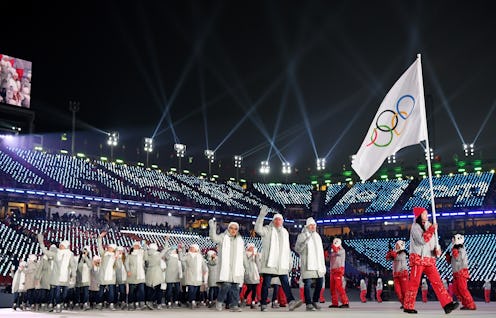News
An OAR Athlete Is Accused Of Doping & It Could Mean Even More Consequences For Russia

One of the Russian athletes competing in the 2018 PyeongChang Winter Games reportedly failed a drug test. Reports say an OAR athlete is accused of doping during the Olympics, and it could mean big repercussions for the controversy-ridden team.
Bronze medal-winning curler Alexander Krushelnytsky may have doped, according to Russia's Sport Express, though his name was not immediately confirmed by the Olympics or the OAR team. The paper reported that Krushelnytsky tested positive for the substance meldonium, which has been banned since 2016. The substance is used to improve blood flow and is usually prescribed to heart attack victims. Maria Sharapova famously tested positive for the drug in January 2016 and was banned for 15 months from tennis.
This would mean huge consequences for any athlete — he and his curling partner (and wife), Anastasia Bryzgalovoy, could be stripped of the bronze medal they won. But for an OAR athlete, or "Olympic Athlete from Russia," the stakes are much higher. Russia was banned from the 2018 PyeongChang games for an alleged state-sponsored doping regime carried out since at least the 2014 Olympic games in Sochi, though the International Olympic Committee allowed in individual athletes who had tested clean.
The Russian OAR team confirmed the possibility of an athlete failing a doping test, but it did not name the individual, the Guardian reported. The team said it would wait until a second sample is tested before doing so:
Today, the headquarters of our delegation received an official notification from the IOC about a possible violation of the anti-doping rules. We do not call the name of the athlete or athlete, as well as the sport prior to the results of the opening of the sample B.
In addition to having the medal revoked, the news could put at risk the OAR team's ability to march under the Russian flag at the closing ceremony. There was the possibility that they would be allowed, even though at the opening ceremony the team was forced to march under the Olympic flag with no clear connection to Russia — even on their outfits.
That was on the condition of adhering to a prescribed code of conduct during the games, requiring them to stay neutral.
An International Olympic Committee spokesperson told The Globe & Mail that the results are both "disappointing" but also reassuring. "On the one hand it is extremely disappointing when prohibited substances might have been used, but on the other hand it shows the effectiveness of the anti-doping system at the Games which protects the rights of all the clean athletes," the IOC spokesperson said.
The Russian media outlet that first named Krushelnytsky, Sport Express, included the possible defense that one of his teammates at a training center could have given him the drug without his knowledge.
Krushelnytsky is one of 169 Russian athletes at the games competing under the OAR moniker. It's the third-largest group at the games, after the United States and Canada.
Another 47 athletes appealed the IOC ban to try and compete at the games, but their petition was denied just a few hours before the opening ceremony began. Russian officials had argued the process to approve athletes for competition was "difficult to challenge" and "not transparent." The Court of Arbitration for Sport disagreed.
Russia faced a number of difficulties after the doping at the 2014 Sochi Games came to light. One was the revocation of many of the country's medals at those games. But in another recent decision, some 28 athletes saw their doping decisions from the 2014 Games overturned. That decision would put Russia back on top of the medal table.
How the OAR athletes do this year in the medal count will depend, it seems, on the results of their drug tests.